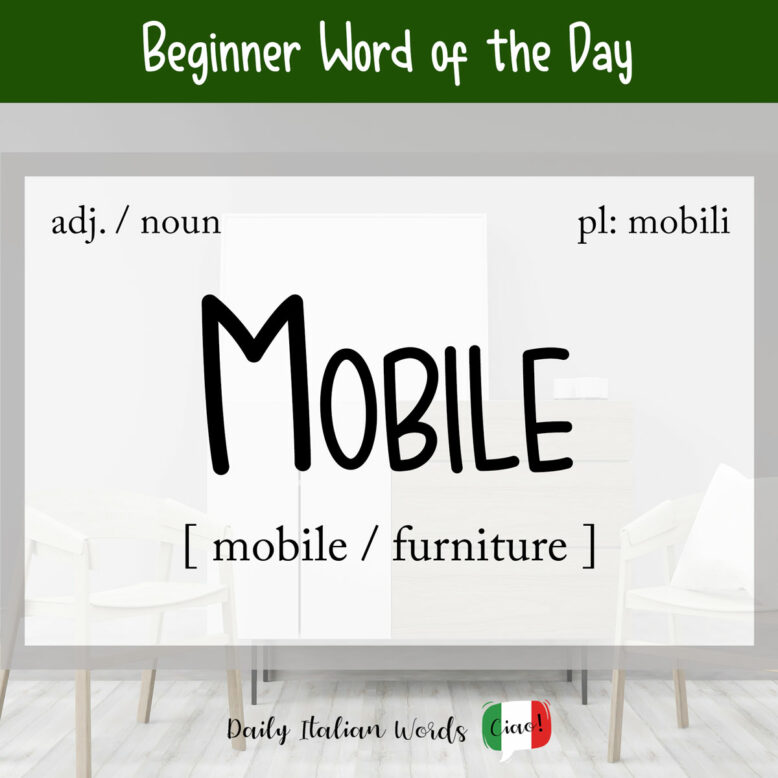Mobile is a word with various meanings in Italian but perhaps not everybody knows that one of the most common is furniture.

Mobile is a masculine noun whose definite and indefinite articles are as follows:
- il mobile
- un mobile
- i mobili
- dei mobili
Its singular form means a single piece of furniture whereas the plural mobili generally refers to furniture as a whole. That said, the singular is also used to mean furniture in some cases, such as for example, la fiera del mobile (the furniture show). Another way to say furniture as a whole is by using the feminine noun mobilia.
To indicate a category of furniture, you can say mobili da cucina (kitchen furniture), mobili da bagno (bathroom furniture), mobili da ufficio (office furniture) and so on.
Some common types of furniture you’ll find in most homes include:
- divano = sofa / couch
- poltrona = armchair
- libreria = bookshelf
- comò = chest of drawers
Non devi per forza comprare dei mobili nuovi. Puoi trovare un sacco di roba di seconda mano in ottime condizioni.
You don’t have to buy new furniture. You can find a lot of stuff second-hand in excellent condition.

The reason furniture is called mobile/i in Italian is because it is quite literally mobile! 😉
Speaking of things that are mobile, the Italian word, as an adjective, assumes the same meaning as the English word, and that is “anything that is movable or not fixed”. For example, the moving parts of a device are le parti mobili di un congegno.
There are also similarities in telecommunication terminology: rete mobile means mobile network and operatore / gestore di telefonia mobile is mobile phone operator.
Curiously, Italians have adopted the English mobile banking and mobile payment into their vocabulary. But if you want to say mobile phone, there is no such thing as telefono mobile. Instead, you have to say telefono cellulare, cellulare on its own, or telefonino (which literally means ‘small phone’).
Ho confrontato le varie offerte di telefonia mobile ma sono indeciso su quale scegliere.
I’ve compared the various offers of mobile phone operators, but I’m undecided about which one to choose.

The use of mobile in Italian expands to additional expressions such as the ones below:
- beni mobili = movable assets (as opposed to beni immobili = properties)
- scala mobile = escalator (lit. moving staircase)
- sabbie mobili = quicksand (lit. moving sands)
Mobile can also be used to indicate that something is unstable such as, for example, the wobbly leg of a table.
La gamba di questo tavolo è un po’ mobile. Se mi dai un cacciavite, provo a sistemarla.
The leg of this table is a bit wobbly. If you give me a screwdriver, I can try to fix it.
Another meaning for mobile is quick or agile, as well as fickle. The latter refers in particular to the famous aria of the Rigoletto opera (La donna è mobile = The woman is fickle). You can listen to it, sung by Luciano Pavarotti, by watching the clip below.
There are other meanings that are more technical, related to physics, medicine and astronomy, but the last one I wanted to share with you sees mobile become a feminine noun: la squadra mobile, which can be shortened to just (la) mobile. In Italy, la mobile is a subdivision of state police that focuses on the prevention and inspection of crimes. Agents operate in plain civilian clothing rather than in uniform. It is similar to the flying squad of the London Metropolitan Police.
Il capo della mobile è arrivato, capitano.
The head of the flying squad has arrived, captain.
You will also hear unità mobile (mobile unit) which often refers to special vehicles supplied with the basic equipment for medical purposes.

Heather Broster is a graduate with honours in linguistics from the University of Western Ontario. She is an aspiring polyglot, proficient in English and Italian, as well as Japanese, Welsh, and French to varying degrees of fluency. Originally from Toronto, Heather has resided in various countries, notably Italy for a period of six years. Her primary focus lies in the fields of language acquisition, education, and bilingual instruction.


